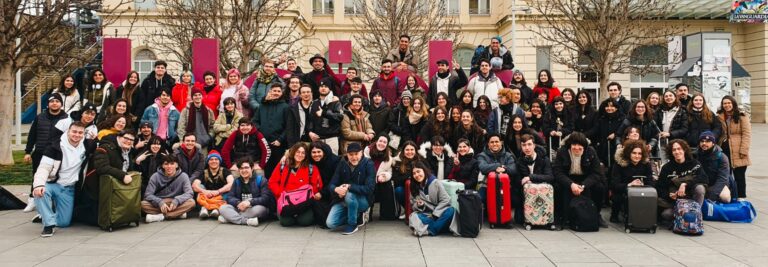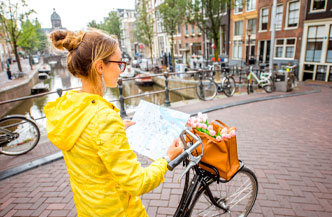
University life > Erasmus and international exchange
Erasmus and international exchange
At UDIT there are no borders
Thanks to the exchange agreements and the Erasmus+ programme, you will be able to spend time at the most important international universities in the field of Design and Technology. From the third year onwards you will be able to live your international experience. Stays can take place in either the first or second semester, or even for a whole academic year if you prefer.
Students of any Official Degree at UDIT can access one of the two available options, in order to undertake a mobility of studies sojourn.

1. Exchanges in Europe
Sojourns at institutions of countries in the Erasmus+ programme.

2. Bilateral exchanges
Sojourns at institutions in countries outside Europe.
At the end of your sojourn, the subjects passed will be recognised as UDIT subjects as previously agreed. For more information on international placements, please visit the International section. (link to international section)
FAQs
How long does the exchange last?
What types of exchange are there and what is the difference?
Bilateral exchanges take place both within and outside the traditional European Erasmus environment. In both cases, there is an inter-university institutional agreement. The fundamental difference is that students in the Erasmus+ process follow the guidelines or processes, and enjoy the benefits of the European Commission’s mobility programme. The other exchanges are based on private university cooperation agreements between the institutions.
These agreements are generally signed on identical terms so that both options are as similar as possible to each other in terms of process and fundamentals, including ensuring the recognition of ECTS credits upon return to your home university. The major difference will be that bilateral exchanges will not involve financial support from the European programme.
Will you be accepted when your home university informs you that you have been nominated for a placement?
What are the selection requirements at UDIT and the admission requirements of the host university?
- Language level of the host institution.
- Academic record.
- Portfolio.
- Other requirements. There may be additional ones, such as a request for an interview.
How is registration handled?
- Usual UDIT registration, within the official deadlines, by paying the academic fees
- Registration at the host university, once there and according to the instructions provided by the corresponding department or International Relations Office. This is simply a registration procedure in the system and the virtual campus of the institutions.
What is the financial cost of going on exchange?
You should be aware that studying abroad entails additional costs, especially for the student’s family, and significant extra financial effort and sacrifice.
Travel, accommodation and living expenses must be added to the UDIT registration fees. In an attempt to alleviate this situation, certain financial assistance mechanisms are available:
- The National Agency for Erasmus, SEPIE, grants a travel and subsistence allowance. For student mobility, this grant is allocated according to the host country, and is administered by the sending university so that it is available to the students, when the Agency transfers it to the institution. This support may vary from year to year. For the academic year 2020/21, it will be between €200 and €300 per month, for the months granted. Before going abroad, the student signs a financial agreement with the beneficiary university, which then sends it to the SEPIE National Agency. The purpose of Erasmus+ financial support is not to fully fund the sojourn in the host country but to provide support to reduce the overall costs.
- The Regional Government of Madrid, through its Department of Education, grants aid to promote the mobility of university students from the universities of Madrid.
How are subjects taken abroad recognised in Spain?
Before the mobility, the student, together with the coordinator of each degree course, will have made a pre-selection of the subjects to be studied from among those offered by the host university. This document will be signed by the exchange coordinator of the Degree, the person in charge of the International Relations Office and by the student. Once abroad, students must confirm, by email to their coordinator at UDIT, any changes that may arise and the definitive subjects for which they have enrolled in each semester. Any modification made without UDIT’s knowledge exonerates UDIT from any responsibility for validating the course.
In this way, as long as the student passes the planned subjects, they will be recognised and validated. At the end of the studies abroad, the host university will issue a certificate – academic transcript – stating the credits and grades obtained, so that UDIT can carry out the agreed equivalences.
What happens to subjects failed abroad?
CONTACT
Verónica Meléndez
Head of International Relations & Partnerships
Elena Sánchez
Exchange Coordinator
ESNE International Relations Office
international@esne.es
+34 91 5552528 ext. 223
Opening Hours:
Monday to Friday from 9:00 a.m to 2:00 p.m. and from 3:00 p.m. To 6:00 p.m.
ESNE, Building I, 1st floor